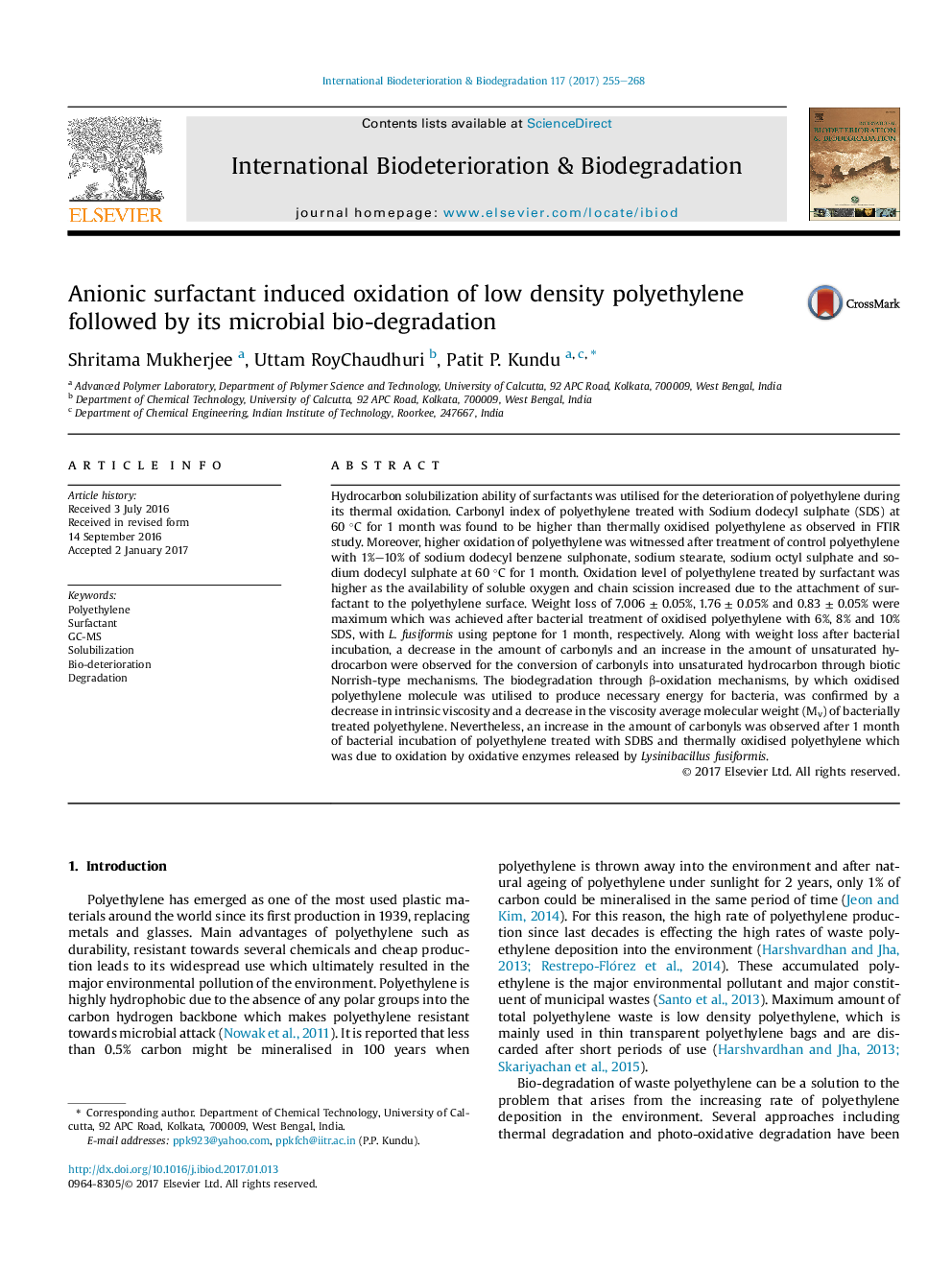| کد مقاله | کد نشریه | سال انتشار | مقاله انگلیسی | نسخه تمام متن |
|---|---|---|---|---|
| 5740533 | 1616300 | 2017 | 14 صفحه PDF | دانلود رایگان |
عنوان انگلیسی مقاله ISI
Anionic surfactant induced oxidation of low density polyethylene followed by its microbial bio-degradation
ترجمه فارسی عنوان
سورفکتانت آنیونی باعث اکسیداسیون پلی اتیلن با ضخامت کم و سپس تخریب زیستی میکروبی آن می شود
دانلود مقاله + سفارش ترجمه
دانلود مقاله ISI انگلیسی
رایگان برای ایرانیان
کلمات کلیدی
موضوعات مرتبط
علوم زیستی و بیوفناوری
علوم محیط زیست
علوم زیست محیطی (عمومی)
چکیده انگلیسی
Hydrocarbon solubilization ability of surfactants was utilised for the deterioration of polyethylene during its thermal oxidation. Carbonyl index of polyethylene treated with Sodium dodecyl sulphate (SDS) at 60 °C for 1 month was found to be higher than thermally oxidised polyethylene as observed in FTIR study. Moreover, higher oxidation of polyethylene was witnessed after treatment of control polyethylene with 1%-10% of sodium dodecyl benzene sulphonate, sodium stearate, sodium octyl sulphate and sodium dodecyl sulphate at 60 °C for 1 month. Oxidation level of polyethylene treated by surfactant was higher as the availability of soluble oxygen and chain scission increased due to the attachment of surfactant to the polyethylene surface. Weight loss of 7.006 ± 0.05%, 1.76 ± 0.05% and 0.83 ± 0.05% were maximum which was achieved after bacterial treatment of oxidised polyethylene with 6%, 8% and 10% SDS, with L. fusiformis using peptone for 1 month, respectively. Along with weight loss after bacterial incubation, a decrease in the amount of carbonyls and an increase in the amount of unsaturated hydrocarbon were observed for the conversion of carbonyls into unsaturated hydrocarbon through biotic Norrish-type mechanisms. The biodegradation through β-oxidation mechanisms, by which oxidised polyethylene molecule was utilised to produce necessary energy for bacteria, was confirmed by a decrease in intrinsic viscosity and a decrease in the viscosity average molecular weight (Mv) of bacterially treated polyethylene. Nevertheless, an increase in the amount of carbonyls was observed after 1 month of bacterial incubation of polyethylene treated with SDBS and thermally oxidised polyethylene which was due to oxidation by oxidative enzymes released by Lysinibacillus fusiformis.
ناشر
Database: Elsevier - ScienceDirect (ساینس دایرکت)
Journal: International Biodeterioration & Biodegradation - Volume 117, February 2017, Pages 255-268
Journal: International Biodeterioration & Biodegradation - Volume 117, February 2017, Pages 255-268
نویسندگان
Shritama Mukherjee, Uttam RoyChaudhuri, Patit P. Kundu,
